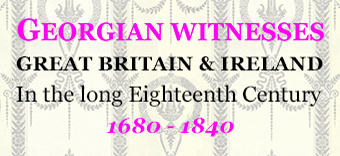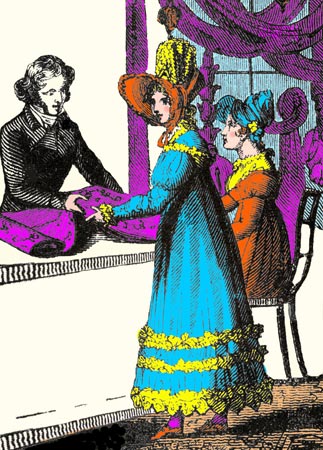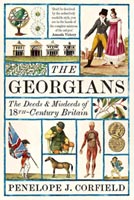Georgian Witnesses
14 / CONTRASTING LIVES AMONG THE EMERGENT GEORGIAN MIDDLE CLASS, WITH COMMENTARIES ON THEIR SOCIAL ROLE
FIVE CONTRASTING LIVES
14.1 ASPIRING
John Trusler (1735-1820), author of The Way to be Rich and Respectable: Addressed to Men of Small Fortune (1755; and many later editions), tried his hand restlessly at many businesses but became best known for his aspirational advice book. Trusler was born in London, to respectable parents of ‘middling’ status and well educated, becoming a clergyman and also studying for a medical degree. He moved restlessly from place to place, and business to business, producing a stream of publications, including histories, etiquette books, sermons, a travelogue, a novel and A Compendium of Useful Knowledge (1784). Trusler’s Way to be Rich and Respectable set out to demonstrate how a man with a relatively small income, plus a wife, four children and five servants, could live frugally in the countryside on a few acres of land while still making a public show as an affluent gentleman, and still making modest savings on his annual income. This message was clearly an idealised picture and it was clearly not aimed at the poorest of the poor; but it provides an insight into the aspirations to gentility of the ‘middling sort’ and the scrimping behind the scenes that was often needed to make a fine public show of wealth and respectability.
14.2 RISING
Elizabeth Raffald (1733 – 81), entrepreneur, caterer and author of a best-selling guide to housekeeping and cookery. Raffald was born in Doncaster, of ‘middling’ status, where she was given a good education, including learning French. She worked in domestic service in a large country house for 15 years, before rising to the position of housekeeper, and then marrying the head gardener. The couple moved to Manchester, where Elizabeth Raffald displayed her entrepreneurial skills: she ran a Registry (employment exchange for servants), a cookery school, a catering business, and the couple for a time ran two post-houses (travellers’ inns). The family rose in the world, producing six daughters, each one attended by her own nursemaid; but their fortunes were undermined at one point by John Raffald’s heavy drinking and related financial problems, leading to him being declared bankrupt. After that, their position rallied and again improved, thanks to Elizabeth Raffald’s energy and enterprise, as she published successful guidebooks, one being a Directory for the Town of Manchester (1772) and much the most famous being her cookbook and guide to housewifery, The Experienced English Housekeeper (1769). This work had an enormous success, appearing in many updated editions and in pirated copies; and it inspired many rival and subsequent works well into the nineteenth century. The Raffald family history was an example of industrious rising in the world, while the serious blip occasioned by the husband’s bankruptcy indicates that self-made success could often be precarious. Elizabeth Raffald died suddenly in 1781; her husband lived on until 1809, later becoming a Methodist. Arley Hall. Northwich, Cheshire CW9 6NA, where Elizabeth Raffald first worked, today features Raffald-inspired dishes in its restaurant.
14.3 RISING HIGH
Edward Thurlow, 1st Baron Thurlow (1731 – 1806), barrister, politician and law lord, who served as Lord Chancellor between 1778 – 83 and 1783 – 92. Thurlow was a Norfolk clergyman’s son who had a successful legal career which he then used as the basis for his political rise to the top, taking a generally cautious and conservative stance. At one point, however, Thurlow who, as Lord Chancellor, chaired the House of Lords, was sneered at as a social ‘nobody’ by the ‘noble’ Duke of Grafton. Thereupon Thurlow publicly issued a thunderous rebuke, demanding respect for his office, his experience, and his personal merit. Hence, while he was no political radical, he was a successful meritocrat, who was not afraid to challenge snobbish dukes. Thurlow had three illegitimate daughters, who kept house for him but were unable to inherit his title. In 1792 Thurlow was issued with a second baronial patent, allowing the succession to go, by special remainder, to his nephew who became 2nd Baron Thurlow. This case of advancement from middling status into the lower tiers of the aristocracy was not uncommon in the case of senior law lords, like John Scott, 1st Earl of Eldon, in the following generation, indicating that leading politicians had need of specific skills and was prepared to reward particularly effective practitioners with titles.
14.4 STEADY-STATING
Jacob Pattisson (1733 – 1805), an Essex wholesale draper in the small market town of Witham, Essex CM8, prospered steadily, gaining the unofficial status title of ‘gentleman’, rather than rising or falling dramatically. He was son of a middling status Essex family, well educated, and with commitments to religious Dissent, hence remaining a relative social outsider from smart society and, in his politics, supporting moderate reform. Pattisson prospered in his own line of business, but, interestingly, he sent both his bright young sons to train for the professions, which were gaining in kudos throughout this period. The older son, Jacob, died young, while ‘walking the wards’ as a trainee doctor in Edinburgh; but the younger son, William Ebenezer Pattisson (1775 – 1848), became a successful solicitor and in 1846 successfully sought from the College of Arms a heraldic coat of arms, cementing the family’s respectability. This trajectory might be considered (in later terminology) as a rise from the ‘middle’ middle class into the upper bourgeoisie, and it can be documented as a result of the unusual family passion, launched by Jacob Pattisson and his second wife Elizabeth, for collecting materials relating to their personal history – materials which enable later scholars to study the dynasty of a ‘middling’ family which was confident in its sense of civic worthiness, without high social position, lands, great wealth, or personal fame.
14.5 FAILING
John Perrott (c.1723-61), a cloth merchant who traded speculatively on credit but then failed and was hanged as a fraudulent bankrupt. Perrott was born in Newport Pagnell, Buckinghamshire, of ‘middling’ status and with a good education; he then went to London and traded as linen draper-cum-cloth merchant, before running out of credit in January 1760. After complaints from his creditors. he was served with a Commission of Bankruptcy, and confined in Newgate Prison. After he had failed to answer the Commission’s questions adequately – and was discovered to have concealed some of his allegedly substantial financial assets – Perrott was convicted of fraudulent bankruptcy and hung.
He was one of very few to face this extreme penalty under the Bankruptcy Law of 1706 and his case revealed the operational weakness of the legislation, since Perrott died without revealing the location of his remaining assets (if any) and his creditors remained unpaid.
FOUR VARIANT COMMENTARIES:
14.6 MIDDLE-CLASS HAPPINESS
The journalist and novelist Daniel Defoe (1660 – 1731), himself the son of a ‘middling’ tradesman, wrote confidently in the first chapter of The Life and Adventures of Robinson Crusoe (1719 – 20), that the middle station of life was: ‘the best state in the world, the most suited to human happiness, not exposed to the miseries and hardships … of the mechanic part of mankind, and not embarrassed with the pride, luxury, ambition and envy of the upper part of mankind’.
14.7 BY THE MID-CENTURY, A GROWING CHORUS OF PRAISE FOR THE ‘MIDDLOCRATS’ DEPICTED THEIR STATE AS THE ‘GOLDEN MEAN’ BETWEEN HIGH AND LOW:
The philosopher David Hume (1711 – 76), himself the son of a middling-status Scottish lawyer, remarked in 1742 (in his Essay on the Refinement of the Arts) that those in the middle sector of society fostered public liberty, since they were neither so poor as to be submissive to authority nor so greedy as to be corrupted into supporting tyrants.
14.8 NOT EVERYONE AGREED, SOME SEEING THE MIDDLE STATE AS ONE OF CONFLICT, ENVY AND UNCERTAINTY
In 1765, a youthful English republican named Michael Wodhull (1740 – 1816), from a wealthy landowning background, wrote a poetic meditation on The Equality of Mankind. He defined those in the social middle as ‘motley Beings’:
Who, dragged by Fortune into Middle Life,
That vortex of malevolence and strife,
Envying the Great and scoffing at the Mean,
Now swol’n with pride, now wasted with chagrin.
Like Mahomet’s unsettled ashes dwell,
Midway suspended between Heaven and Hell.
He was writing from social observation rather than from direct personal experience; but he saw not an Aristotelian ‘golden mean’ but a ‘middling’ world of competition and uncertainty. The poem is also interesting in its assumption that readers would instantly recollect the traditional Christian assertions about the fate of the ashes of
the Prophet Muhammad.
14.9 BUT A SUBSTANTIAL CHORUS OF MIDDLE-CLASS COMMENTATORS PRAISED THE VIRTUE OF THEIR STATE, AND SOME WENT FURTHER, ADVANCING THEIR CLAIMS TO JOIN IN RULING THE COUNTRY:
The experimental chemist Joseph Priestley (1733 – 1804), himself the well- educated son of a skilled Yorkshire cloth finisher, argued in 1768 that, since men of moderate fortunes were ‘generally better educated, [and] have consequently more enlarged minds, and are, in all respects, more truly independent, than those who are born to great opulence’, then the middle class should certainly join in running
the country.
This claim did not have any immediate impact; but confident assertions of that nature contributed to bring onto the political agenda the eventual extension of the franchise to include a middle-class electorate. When such a change eventually ensued in 1832, it seemed to many to be, by that date, signally overdue.




